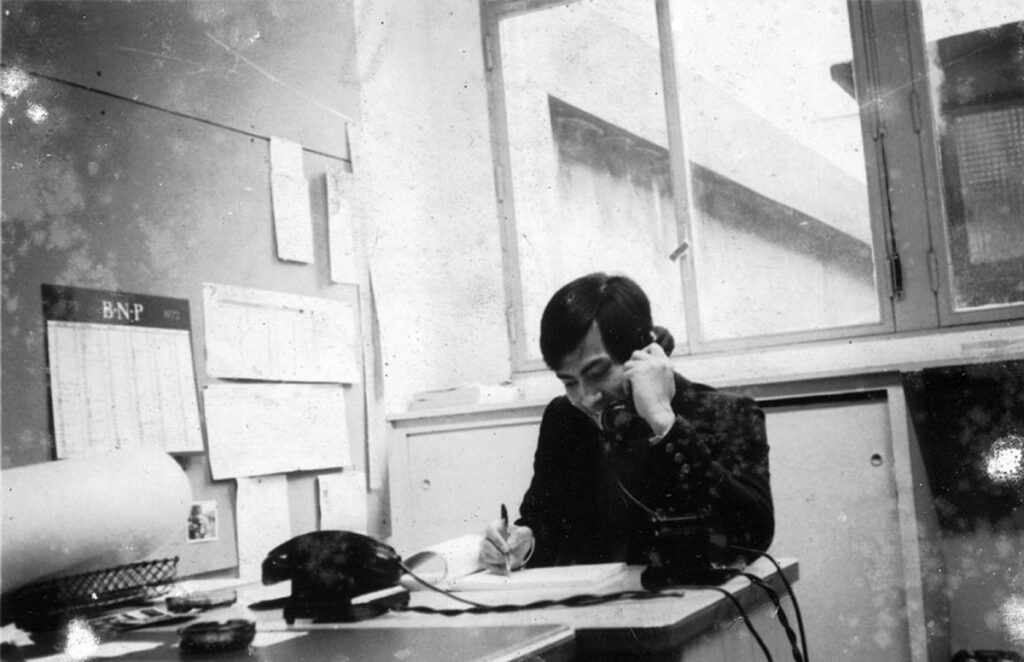My sister was very beautiful and the tallest of the four daughters in our family. My mother loved her the most of her six children, and took Phal with her wherever she went.
When Phal was young, she studied at Rokar Kaong Primary School and played volleyball. She dropped out of secondary school and moved to Phnom Penh in 1970, where she lived with our older brother Phuong. He gave her some money and got her a job as a French typist at the DN military barracks.
While studying at Damrei Sar Pagoda, she got to know Sar Son, who fell in love with her. The two later became lovers. He studied film technology in France for two years, and during that period, he regularly wrote letters and sent gifts to Phal.
Son graduated in 1972 and returned to Cambodia. He and Phal went back to work in Phnom Penh after their marriage. Phal resumed her job, while Son worked at the Ministry of Propaganda as a cameraman for a television news program.
Son secretly made contact with the Khmer Rouge in late 1974. He was arrested and jailed at a political prison for his opposition to the Lon Nol regime. His detention was published in the newspapers. When he started to make contact with the communists, Phal knew about it. She and I often visited him in the prison, where he didn’t have enough to eat or a proper place to sleep. He was a barber in the prison.
When the Khmer Rouge evacuated the people from Phnom Penh, Son was released. All of us traveled together and had only one goal: returning to our home village. Along the streets leading out of Phnom Penh, the Khmer Rouge continuously asked questions about our biographies, and five of my siblings told them the truth. My husband and I had an idea we had to lie to survive. Thus, my husband told them he had been a cyclo [pedicab] driver. Every night the militiamen came to interrogate me about my background, and I did not tell them the truth.
Three or four months later, Son was arrested. Before his arrest, the Khmer Rouge said they wanted him to go back to his old position in Phnom Penh. Not realizing that they were lying, Son told Phal to wait for him in Rokar Kaong. He disappeared after that.
Later, the Angkar called Phal and her son to Phnom Penh. A militiaman came and said he would bring her to see her husband; she never returned. Three of my siblings, their husbands, wives, and children were arrested by the Angkar in connection with Phal.
Em Phuong, our oldest sister, whose husband was a policeman, was also brought to be killed with her family when they were evacuated to Prey Veng Province. Phalla, our youngest sister, and her family starved to death in Pursat Province. Samon, our youngest brother and a former Lon Nol soldier, was also murdered by the Angkar.
My brother Em Samuth was recruited by the Khmer Rouge in 1973 and became a soldier. When he ran away to Phnom Penh, they caught him and put him in Damrei Sar Prison just a few days before April 17, 1975. They killed him on Rokar Kaong Island. I am the only one of my siblings who survived.
In 1980, our commune chief went to Tuol Sleng prison in Phnom Penh and came back saying he saw Phal’s picture there under a sign that said “Women of Rokst Kaong 1 Subdistrict.” But he did not see a picture of my brother-in-law, Sar Son. My mother also visited the prison and when we returned home, she had insomnia and became ill. She died in 1983 because she missed Phal so much.
Em Phal and Sar Son were killed at Tuol Sleng prison. Sar Son’s biography and confessions state that had been a film engineer at the Ministry of Propaganda. He was arrested on May 28, 1975 and sent to Tuol Sleng on February 14, 1976. His last confession was dated December 28, 1976.
Em Phal was arrested on June 1, 1975. “Ask for a physical description and current address for the arrest of the persons on whom the spy put the blame,” Tuol Sleng Chief Duch wrote on her biography.

